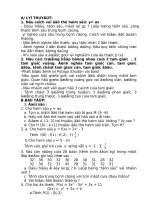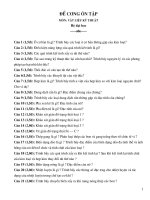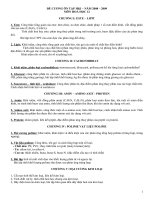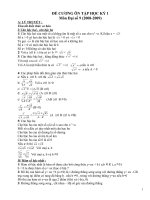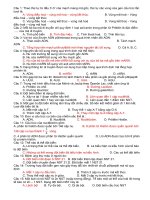De cuong on tap TAnh8_08-09
Bạn đang xem bản rút gọn của tài liệu. Xem và tải ngay bản đầy đủ của tài liệu tại đây (49.98 KB, 2 trang )
ĐỀ CƯƠNG ÔN TÂP ANH VĂN 8 – HỌC KỲ II – 2008 - 2009
I. Chủ diểm – từ vựng :
1. Cấp cứu và y tế (Unit 9)
2. Bảo vệ môi trường (Unit 10)
3. Du lòch quanh Việt Nam và thế giới (Unit 11, 12 )
4. Lễ hội (Unit 13)
5. Những kì quan và đòa danh nổi tiếng thế giới (Unit 14)
6. Máy tính (Unit 15)
7. Những phát minh nổi tiếng trong lòch sử (Unit 16)
II.Grammar :
1.Tenses :
A.Past continuous tense :
S + was / were + V(ing)
S + wasn’t / weren’t + V(ing)
Was /Were + S + V(ing) … ?
- Để diễn tả một sự việc đang diễn ra tại một thời điểm xác đònh trong quá khứ
Ex : Lan was watching TV at 10 o’clock yesterday morning
- Thì quá khứ tiếp diễn thường được dùng với thì quá khứ đơn để cho biết rằng môt sự việc bất chợt xảy ra trong lúc một
sự việt khác đang tiếp diễn
Ex : The Le family was sleeping when the mailman came
The mailman came while the Le family was sleeping
B.Present perfect :
S + has / have + V (III)
S + hasn’t / haven’t + V (III)
Has / Have + S + V (III) …… ?
- Được dùng với “How long” , “since” và “for” để diễn đạt một hành động bắt đầu trong quá khứ nhưng vẫn còn tiếp
diễn ở hiện tại và có thể đến tương lai
Ex : How long have you been here ?
I’ve been here for a week / since last week
- Được dùng với “yet” để diển tả một sự việc đến lúc nói vẫn chưa xảy ra
Ex : Has Nam done his homework yet ?
No , He hasn’t done his homework yet
- Được dùng với “ already” để diển tả một sự việc đã hoàn thành trong quá khứ nhưng không đề cập đến thời gian xảy ra
Ex : I have already seen this film
C. Present continuous tense with “always”
S + am /is /are + always + V(ing)
- Để diễn tả một sự việc cứ lặp đi lặp lại nhiều lần như một thói quen , người nói biểu lộ sự tức giận , phàn nàn
Ex : You are always forgetting your homework
III.Passive :
S V O (Active)
S (be )+ V (III ) (by O) (Passive)
1. Present simple tense: is /am /are + V(III)
2. Present continuous : am / is are + being + V (III )
3. Simple past tense : was/ were + V(III)
4. Simple future tense : will / shall + be + V(III)
5. Present perfec t: has/ have + been + V(III)
6. Modal verbs : modal + be + V (III)
III .Reported speech :
( Có một số thay đổi về thì , đại từ , trạng từ ở mệnh để được tường thuật ( Xem lại Unit 13 ( LF .4) , Unit 14 (Lf2)
1.Statements :
S1 + said + (that) + S2 + V …………
S1 + told + O + (that) + S2 + V …………
Ex : Ba said “I’m living in London now”
Ba said that he was ling in London then
2.Yes – No questions :
S1 + asked + O + If / Whether + S2 + V ……………
wondered
wanted to know
Ex: “Are you hungry?” She asked us
She asked us if we were hungry
“ Does Lan like Vietnamese food ?” He wanted to know
He wanted to know whether Lan liked Vietnamese food
III.Requests with “Would / Do you mind … ? :
1. Requests :
Would / Do you mind + V(ing) ……… ?
Ex : Could you tell me how you learned English at school ?
Would / Do you mind telling me how you learned English at school
2. Asking for permission :
Do you mind + If I + V ( simple present ) ……… ?
Would you mind + If I + V ( simple past ) ……… ?
Ex : Can I borrow use your computer for one house ?
Do you mind If I use your computer for one house ?
Would you mind If I used your computer for one house ?
IV.Sentences patterns :
1. …… so as to / in order to + V(inf) : Để làm………
Ex : People use first – aid so as to / in order to ease the victim’s pain and anxiety
2.Adjective followed by - an infinitive : It’s difficult to do this exercise
- noun clause : I am delighted that you passed your English exam
3. – ed and –ing participles :
a. Verb – ing Present participle
- A present participle ( phrases ) can be used as an adjectives to qualify a noun with active meaning
Ex : Do you know the girl talking to Nam
b. Regular verb + ed
Inregular verb + V3
- A past participle ( phrases ) can be used as an adj to qualify a noun with passive meaning
Ex : The man injured in the accident was taken to the hospital
4. Verb + to - inf :
Decide / want / plan / promise / start / begin / try + to –V
Ex : It begins to rain
5. Compound words : N – V ( ing)
Ex : Viet Nam is a country which export a lot of rice
Viet Nam is a rice – exporting country
V. Writing :
. Thư cảm ơn ( Thank – you letter ) - U.9
. Thư kể về chuyến đi thăm một nơi náo đó ( U.12 + U.14)
. Viết lới hướng dẫn ,chuyện có sử dụng sequence markers ( first , then , next , after that , finally)
( Unit 10 , 11 , 15, 16)
. Viết về lễ hội ( Unit 13)
Past participle
